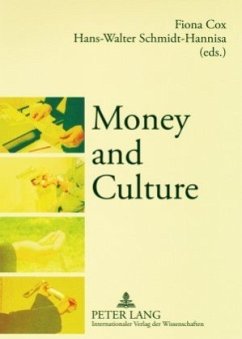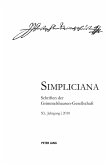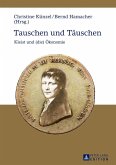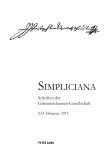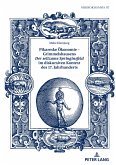Money and Culture
Herausgegeben:Cox, Fiona; Schmidt-Hannisa, Hans-Walter
Money and Culture
Herausgegeben:Cox, Fiona; Schmidt-Hannisa, Hans-Walter
- Broschiertes Buch
- Merkliste
- Auf die Merkliste
- Bewerten Bewerten
- Teilen
- Produkt teilen
- Produkterinnerung
- Produkterinnerung
This interdisciplinary collection of twenty-five essays examines the construction of national, social and individual identities in response to money, or the lack of it, and the ways in which such identities are reflected in media as disparate as coins and films, literary texts and museums, autobiographies and architecture. It takes the reader from Roman Britain to the consumer society of twenty-first century Ireland, from the coins of the German Middle Ages to the virtual economies of postmodern America. Money and Culture focuses not only on economic aspects of cultures but also on specific…mehr
Andere Kunden interessierten sich auch für
![Simpliciana XL (2018) Simpliciana XL (2018)]() Simpliciana XL (2018)126,80 €
Simpliciana XL (2018)126,80 €![Tauschen und Täuschen Tauschen und Täuschen]() Tauschen und Täuschen54,90 €
Tauschen und Täuschen54,90 €![Simpliciana XLI (2019) Simpliciana XLI (2019)]() Simpliciana XLI (2019)110,60 €
Simpliciana XLI (2019)110,60 €![Pikareske Ökonomie ¿ Grimmelshausens «Der seltzame Springinsfeld» im diskursiven Kontext des 17. Jahrhunderts Pikareske Ökonomie ¿ Grimmelshausens «Der seltzame Springinsfeld» im diskursiven Kontext des 17. Jahrhunderts]() Malte KleinjungPikareske Ökonomie ¿ Grimmelshausens «Der seltzame Springinsfeld» im diskursiven Kontext des 17. Jahrhunderts66,75 €
Malte KleinjungPikareske Ökonomie ¿ Grimmelshausens «Der seltzame Springinsfeld» im diskursiven Kontext des 17. Jahrhunderts66,75 €![allmächtig und unfassbar allmächtig und unfassbar]() allmächtig und unfassbar30,00 €
allmächtig und unfassbar30,00 €![Die Schlaraffenlandkarte um 1700 Die Schlaraffenlandkarte um 1700]() Christine WederDie Schlaraffenlandkarte um 170029,00 €
Christine WederDie Schlaraffenlandkarte um 170029,00 €![Schwarzer Wald und kaltes Herz Schwarzer Wald und kaltes Herz]() Horst FritzSchwarzer Wald und kaltes Herz9,90 €
Horst FritzSchwarzer Wald und kaltes Herz9,90 €-
-
-
This interdisciplinary collection of twenty-five essays examines the construction of national, social and individual identities in response to money, or the lack of it, and the ways in which such identities are reflected in media as disparate as coins and films, literary texts and museums, autobiographies and architecture. It takes the reader from Roman Britain to the consumer society of twenty-first century Ireland, from the coins of the German Middle Ages to the virtual economies of postmodern America. Money and Culture focuses not only on economic aspects of cultures but also on specific cultural forms to deal with money, and reminds us of the symbiotic relationship between money and culture.
Produktdetails
- Produktdetails
- Verlag: Peter Lang
- Artikelnr. des Verlages: 56790
- Seitenzahl: 376
- Englisch
- Abmessung: 20mm x 148mm x 210mm
- Gewicht: 500g
- ISBN-13: 9783631567906
- ISBN-10: 3631567901
- Artikelnr.: 25079150
- Herstellerkennzeichnung Die Herstellerinformationen sind derzeit nicht verfügbar.
- Verlag: Peter Lang
- Artikelnr. des Verlages: 56790
- Seitenzahl: 376
- Englisch
- Abmessung: 20mm x 148mm x 210mm
- Gewicht: 500g
- ISBN-13: 9783631567906
- ISBN-10: 3631567901
- Artikelnr.: 25079150
- Herstellerkennzeichnung Die Herstellerinformationen sind derzeit nicht verfügbar.
The Editors: Fiona Cox is a Lecturer in French at the National University of Ireland, Cork. She published books and articles on Butor, Hugo and Virgil.
Hans-Walter Schmidt-Hannisa is Professor of German at the National University of Ireland, Galway. His research interests include German Enlightenment and Romanticism, the literary and cultural history of dream, and the history of reading.
Hans-Walter Schmidt-Hannisa is Professor of German at the National University of Ireland, Galway. His research interests include German Enlightenment and Romanticism, the literary and cultural history of dream, and the history of reading.
Contents: Fiona Cox/Hans-Walter Schmidt-Hannisa: Introduction - Michael Hutter: Visual Credit: The Britannia Vignette on the Notes of the Bank of England - Cordula Politis: Wisdom vs Riches: The Discourse of Money in Fortunatus - Michael Shields: Songs and Money as a Mirror of the Self. Reflections on Ehrenbote von Rhein's Spiegelweise - Michael Fodor: Diderot and the Play of Money - William Carter: «Uralte und nie gehobne Beschweerde»: Goethe, Faust and Taxes - Anders Mortensen: Romantic Critics of Political Economy - Sheila Dickson: Finding Treasure in the Works of Achim von Arnim - Kirill Postoutenko: Kapital and picaresque: Towards the Typology of abstractio in European Culture - Armin Schäfer: Mad Money: Melville's Doubloon - Fiona Cox: Pygmalion and the Prostitute: Processes of Exchange in Hugo's Les Misérables - Niamh Sweeney: Strategies of Potential. The Idea of Gaming in Baudelaire's Aesthetic of Modern Life - Dick Collins: The Price of Mrs Lovett's Pies: Blood and Cash in the Penny Dreadful - Mary Pierse: George Moore, Sherlock Holmes and the Many Money Questions in Fin-de-Siècle English Fiction - Hans-Walter Schmidt-Hannisa: Love for Sale. Men, Women and Money in Works by Arthur Schnitzler - Brian Moloney: Exchange Rates in Italo Svevo's Later Narrative Fiction - Guy Snaith: All Because of Money: Money and Culture in Gabrielle Roy's Bonheur d'occasion - Ekkehard Knörer: Of Signs and Money in Robert Bresson's Film L'Argent - Ailbhe Thunder: Filming the Virtual Economy from Wall Street to Boiler Room - Joyce Goggin: Casinos and Sure Bets - Ocean's Eleven and Cinematic Money - Christina Oldman: Financial Identities in the American Tycoon Autobiographies by Andrew Carnegie and John D. Rockefeller: Credit Negotiations as Creator of Masculinity - Matthias Weiss: The Trading Floor in the Display Case: Stock Exchange Capitalism as Expressed through the Medium of the Museum Exhibition - Michael Bzdak: Money in the Bank? Corporate Support of the Arts in Twentieth Century American Art - Mary O'Neill: Art and Money: Experience Destruction Exposure - Sina Vatanpour: Money, Language and Identity in Paul Auster's City of Glass and Ghosts - Joachim Schwend: «Pecunia non olet»: Money and Consumer Cultures.
Contents: Fiona Cox/Hans-Walter Schmidt-Hannisa: Introduction - Michael Hutter: Visual Credit: The Britannia Vignette on the Notes of the Bank of England - Cordula Politis: Wisdom vs Riches: The Discourse of Money in Fortunatus - Michael Shields: Songs and Money as a Mirror of the Self. Reflections on Ehrenbote von Rhein's Spiegelweise - Michael Fodor: Diderot and the Play of Money - William Carter: «Uralte und nie gehobne Beschweerde»: Goethe, Faust and Taxes - Anders Mortensen: Romantic Critics of Political Economy - Sheila Dickson: Finding Treasure in the Works of Achim von Arnim - Kirill Postoutenko: Kapital and picaresque: Towards the Typology of abstractio in European Culture - Armin Schäfer: Mad Money: Melville's Doubloon - Fiona Cox: Pygmalion and the Prostitute: Processes of Exchange in Hugo's Les Misérables - Niamh Sweeney: Strategies of Potential. The Idea of Gaming in Baudelaire's Aesthetic of Modern Life - Dick Collins: The Price of Mrs Lovett's Pies: Blood and Cash in the Penny Dreadful - Mary Pierse: George Moore, Sherlock Holmes and the Many Money Questions in Fin-de-Siècle English Fiction - Hans-Walter Schmidt-Hannisa: Love for Sale. Men, Women and Money in Works by Arthur Schnitzler - Brian Moloney: Exchange Rates in Italo Svevo's Later Narrative Fiction - Guy Snaith: All Because of Money: Money and Culture in Gabrielle Roy's Bonheur d'occasion - Ekkehard Knörer: Of Signs and Money in Robert Bresson's Film L'Argent - Ailbhe Thunder: Filming the Virtual Economy from Wall Street to Boiler Room - Joyce Goggin: Casinos and Sure Bets - Ocean's Eleven and Cinematic Money - Christina Oldman: Financial Identities in the American Tycoon Autobiographies by Andrew Carnegie and John D. Rockefeller: Credit Negotiations as Creator of Masculinity - Matthias Weiss: The Trading Floor in the Display Case: Stock Exchange Capitalism as Expressed through the Medium of the Museum Exhibition - Michael Bzdak: Money in the Bank? Corporate Support of the Arts in Twentieth Century American Art - Mary O'Neill: Art and Money: Experience Destruction Exposure - Sina Vatanpour: Money, Language and Identity in Paul Auster's City of Glass and Ghosts - Joachim Schwend: «Pecunia non olet»: Money and Consumer Cultures.

